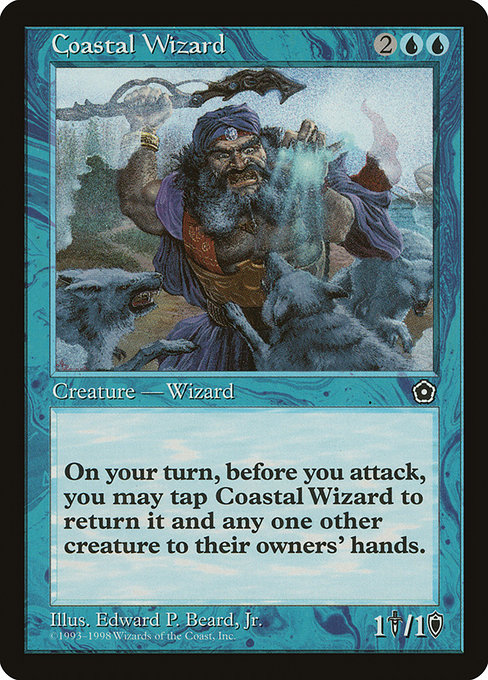
Image courtesy of Scryfall.com
Blue Loops in a Classic Era: Coastal Wizard and Graveyard Recursion
Blue magic has always thrived on tempo, options, and clever timing. Coastal Wizard, a modest 1/1 for {2}{U}{U}, is a perfect emblem of those traits from Portal Second Age, a Starter set that carried the magic of early formats into players’ hands. Its ability—“{T}: Return this creature and another target creature to their owners’ hands. Activate only during your turn, before attackers are declared.”—offers a tiny, powerful engine: the chance to bounce creatures back to hand, reframe combat, and start a fresh set of plays on the very next turn. It’s not flashy like a bomb rare, but it embodies the spirit of blue: control the board you want, not the board you’re given 🧙♂️🔥.
What makes Coastal Wizard sing in the context of graveyard recursion is not the creature itself but the way it interacts with the graveyard as a resource. Graveyard recursion is all about getting value out of cards that have shuffled off to the graveyard and then returning them to hand or battlefield at the right moment. Coastal Wizard acts as a deliberate, repeatable reset button: it increments your tempo by replacing one of your creatures in a value-forward loop, while also enabling you to keep a crucial creature in playstate or to neutralize an otherwise dangerous attacker by bouncing them away before combat. The result is a dance of decisions: you set up a later, safer attack, or you buy time to rebuild while your opponents blink at the blue fog you’ve conjured 🔵💎.
Consider a typical line you might try with graveyard recursion in mind. You start with Coastal Wizard on the battlefield along with a handful of creatures you don’t mind losing to a mass removal—indeed, the value comes from knowing you can pull one creature back to your hand each turn, then replay Coastal Wizard to re-trigger its resilience and continue pressuring or defending as needed. If you have a way to recast the bounced creature from your graveyard (via a separate spell or effect that fetches it back), you can keep this loop alive across multiple turns. The real payoff is the edge you gain in late-game scenarios: your hand grows with more options, you preserve your board presence, and your deck’s built-in blue tools ensure you don’t run out of ways to keep the pressure up 🧙♂️🎲.
In practical terms, you’re leaning into two axes. First, defense and tempo: use Coastal Wizard to bounce a troublesome blocker or a powerful attacker to the opponent’s hand, buying you a turn to set up a proper answer. Second, recursiveness: combine your graveyard engine with repeatable redirections of state-based threats, so you’re always pushing a fresh threat into play or returning a key creature for a new effect. The timing constraint—activate only during your turn, before attackers are declared—forces you to think ahead: when is the best moment to pull back a creature, and which one should you choose to maximize the value of your graveyard assets later in the game? The rhythm is almost musical, a blue-flavored melody of misdirection and momentum that can be as satisfying as it is strategic 🥁💧.
Design-wise, Coastal Wizard’s rarity and age add flavor to any collection. Portal Second Age was a toolkit for new players to explore card interactions without the high-stakes complexity of modern rares, yet the card’s text remains delightfully specific and easy to pivot into modern play styles with casual circles. As a collector, the card’s 1/1 body is a reminder of how early design leaned on clever effects rather than raw raw power. And while it isn’t a standard-legal powerhouse in most formats today, it shines in EDH/Commander casuals and cube drafts where players celebrate archetypes that rely on value loops, graveyard play, and non-traditional combat planning. It’s a quiet gem in a sea of bling—an opportunity to revisit the joy of discovering layers of value in a single tap 🧩⚔️.
For players exploring graveyard recursion in blue, the Coastal Wizard approach provides a sentimental blueprint: maximize tempo by controlling when your creatures return to hand, then leverage those recursions to fuel your next plays. The deck you build around this idea can include counterspells, card draw, and targeted discard to protect your loop and to ensure you’re not simply trading one-wonders for bigger threats. The result can be a surprisingly resilient tempo strategy that outlasts opponents who rely on one-shot plays. And if you’re a collector who loves the historical arc of MTG design, Coastal Wizard serves as a portal—the card is a reminder that even small, well-timed effects can echo through the decades, shaping how players think about recursion, tempo, and the joy of a well-timed bounce 🧙♂️🪄.
Product spotlight
While you’re exploring these classic blue loops, you might also be upgrading your everyday carry with a stylish, modern accessory. Check out Neon Magsafe Card Holder Phone Case, a sleek crossover product that fits into your daily routine as smoothly as Coastal Wizard fits into a graveyard recursion plan. It’s a tactile reminder that the MTG hobby isn’t just about cards—it’s about a shared culture of clever, tangible pieces that sit at the intersection of fandom and function. Grab yours here:
Neon Magsafe Card Holder Phone Case
More from our network
- https://blog.digital-vault.xyz/blog/post/scaretiller-analyzing-engagement-across-mtg-archetypes/
- https://blog.digital-vault.xyz/blog/post/the-ultimate-guide-to-mastering-retargeting-funnels/
- https://crypto-acolytes.xyz/blog/post/surviving-ai-threats-in-futuristic-worlds-practical-tactics/
- https://blog.digital-vault.xyz/blog/post/how-to-build-consistent-product-aesthetics-across-your-brand/
- https://blog.digital-vault.xyz/blog/post/the-story-behind-mtgs-un-sets-scarab-feast/